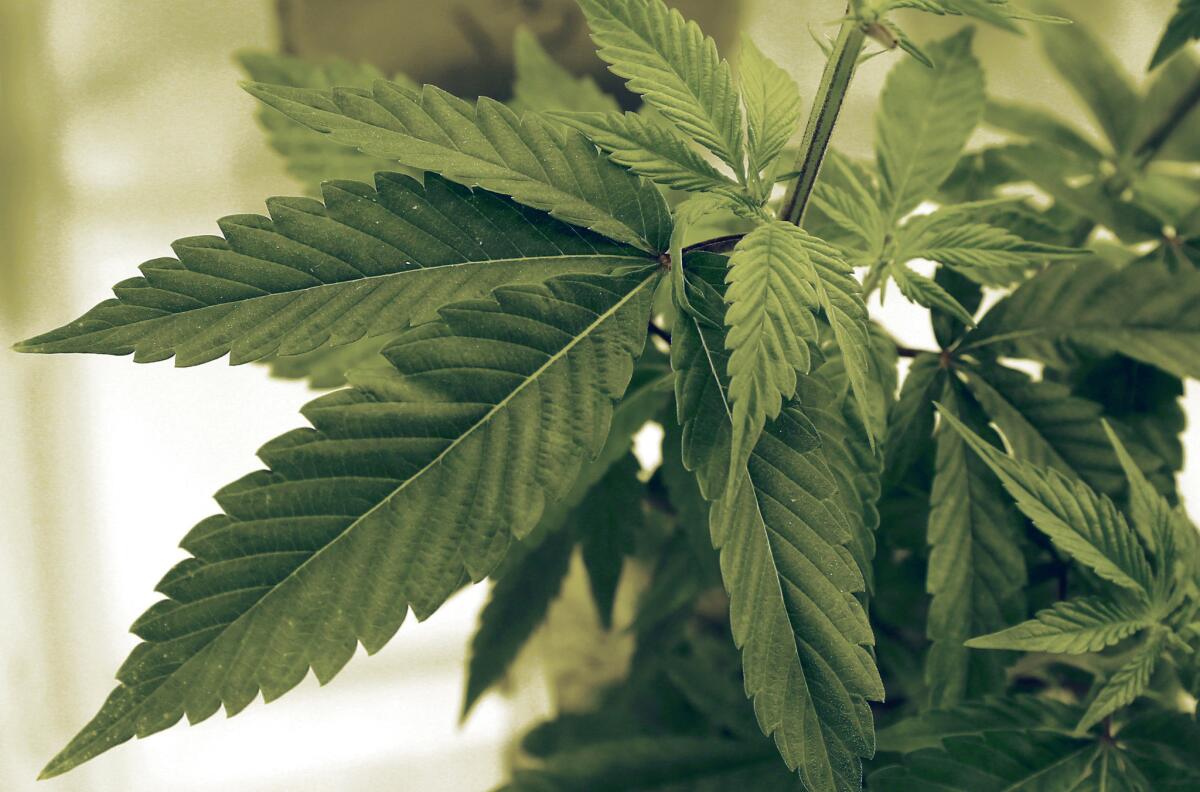L.A. County supervisors pull marijuana tax measure from November ballot

Novemberâs ballot will be crowded with tax initiatives, but a Los Angeles County proposal to fund efforts on homelessness with a tax on marijuana wonât be one of them.
County supervisors voted Tuesday to pull back an initiative they had previously approved for the ballot, which would have placed a 10% tax on gross receipts of marijuana businesses, with the money to be used for housing and services for the homeless.
The supervisors voted 3-2 earlier this month to place the marijuana tax on the ballot. It was a last-ditch effort after several other tax options to raise money for homelessness ran into roadblocks.
The county first pursued a âmillionaireâs taxâ on high-income earners, which would have required a change in state law before it could go forward. County efforts to lobby for legislation granting that authority were unsuccessful.
The supervisors also considered a quarter-cent sales tax and a property tax, but those proposals did not get the votes needed to place them on the ballot, in part because of concerns that they would compete with other sales and property tax proposals on the ballot.
The marijuana tax would have raised less money than the other options. County analysts estimated that it would have eventually brought in $78 million to $130 million a year, with most of that coming only if California voters opted to legalize recreational marijuana in November. Even then, the taxes on recreational marijuana could not have been collected until 2018.
Supervisor Sheila Kuehl, who proposed the marijuana tax measure, later changed course and asked her colleagues to pull it back.
Kuehl said there had been pushback from some homeless service and drug treatment providers who thought the county should not be seen as promoting marijuana legalization. Kuehl said she was worried that without their support, the measure would not get the two-thirds voter support needed to pass.
She pointed to $150 million in initial funding the board approved in February to carry out new efforts to reduce homelessness, including about $100 million in this yearâs budget.
âWeâre still very serious about homeless services,â Kuehl said.
She and Supervisors Michael D. Antonovich and Mark Ridley-Thomas â who both opposed the tax in the initial vote â voted Tuesday to scrap the measure. Supervisors Hilda Solis and Don Knabe were absent.
See the most-read stories this hour >>
Marsha Temple, who runs the nonprofit Integrated Recovery Network, applauded the decision to pull back the marijuana tax.
âI was very worried that we were sending a very wrong message to our clients, who we encourage to take steps to reduce or eliminate their dependence on drugs,â she said.
But she urged the board to pursue a quarter-cent sales tax, which would raise an estimated $355 million a year.
Ridley-Thomas had pushed for that option, but it fell short of the four-fifths vote required to put it on the November ballot.
Some medical marijuana business owners and recreational marijuana legalization advocates supported the marijuana tax proposal, hoping that it would signal a relaxation of the countyâs current ban on both marijuana businesses in unincorporated areas.
But others were skeptical of the proposal, saying the county should lift its ban before looking at taxes.
Tomer Grassiany, a medical marijuana business owner and member of the Los Angeles Cannabis Task Force, said he wants to see the ban lifted and pointed out that if that occurred, the county would be able to share in taxes collected by the state. But he was skeptical of a special tax for homeless services.
âWhile I do think that homelessness is a big problem, I donât necessarily agree that cannabis is the one that should be paying for it,â he said.
Others questioned whether placing too many taxes on marijuana would discourage black-market operations from crossing into the legal economy.
If legalized, recreational marijuana businesses would be subject to a state tax of 15% on gross receipts. A portion of the proceeds would go to local governments, but only if they do not ban marijuana sales within their boundaries. Marijuana businesses would also be required to pay existing state and local sales taxes.
Elizabeth Hawley of the Valley Industry and Commerce Assn. told the supervisors another county tax could have the opposite of the intended affect.
âHomeless funding would be reliant on the legalization ⦠of marijuana, but the taxes on this product will disincentive existing illegal operators from trying to come out and comply with local law,â she said.
Although it appears unlikely that county supervisors will agree on another homeless tax measure in time to place one on the November ballot, voters in the city of Los Angeles will be deciding on a city proposal to issue $1.2 billion in bonds to build more housing for the homeless.
That money, unlike the proceeds of the various tax proposals considered by the county, could not be used for services.
Voters are also expected to decide in November on a countywide sales tax increase to fund transportation projects, a parcel tax for parks and a community college bond measure.
The county could try for a March 2017 ballot initiative on homelessness.
The makeup of the board will change after Novemberâs election, when Antonovich and Knabeâs seats will be up for grabs.
Twitter: @sewella
ALSO
Man arrested on suspicion of sexually molesting 9-year-old boy in mall bathroom
Lack of search warrant damages case against man accused of stalking Sandra Bullock
More to Read
Sign up for Essential California
The most important California stories and recommendations in your inbox every morning.
You may occasionally receive promotional content from the Los Angeles Times.











